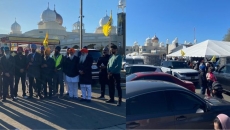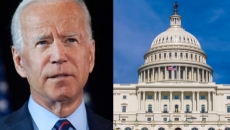Prime Minister Justin Trudeau highlighted Canada's close relationship with its global allies Wednesday during bilateral meetings at the NATO summit, ahead of a dinner the U.S. president was expected to host at the White House.
75 years ago, Canada helped found @NATO — the strongest military alliance in the world.
— Justin Trudeau (@JustinTrudeau) July 10, 2024
Today we’re 32 nations strong — united in the fight for our collective freedom, security, and peace. pic.twitter.com/B8wplxE4qs
Concerns over Joe Biden's health and the possibility of a second Donald Trump presidency have already cast a shadow over the three-day leaders' summit in Washington, D.C.
Trudeau wouldn't respond Tuesday when a reporter asked him if he had concerns about Biden's age or mental acuity.
But President of Poland Andrzej Duda brushed aside questions about the American president on Wednesday, saying he met with Biden "and there is no doubt that everything is OK."
"We don't need to interfere in the American election," Duda said at the summit.
Eighty-one-year-old Biden's age and mental acuity are under international scrutiny after a disastrous debate performance last month against Trump.
Biden delivered a clear and forceful speech at NATO's 75th anniversary celebration Tuesday evening at a critical time for the Democratic leader and for stability in his party. With the eyes of the world watching, it was an important moment for Biden to prove he was capable of being in charge.
But the demands of the summit have just begun. Biden's team has said the president is sharpest earlier in the day and tries to avoid events after 8 p.m. That's the time Wednesday's dinner with the NATO leaders was set to begin.
Trudeau is facing his own pressures during the summit, where Ukraine's ongoing battle with Russia is taking top billing.
Trudeau is set to have a one-on-one discussion with Ukrainian Volodymyr Zelenskyy on Wednesday afternoon.
There has also been increasing pressure from American politicians, who are publicly taking note of the fact that Canada is falling far short of its defence spending commitments.
NATO allies have agreed to spend at least the equivalent of two per cent of their national gross domestic product on defence. Canada's current spend is around 1.37 per cent.
Trudeau tried to get ahead of the criticism during a speech Tuesday in which he said the Liberal government has been following through on promises to drastically increase defence spending since it came into power.
Since 2014, Canada's defence budget has grown by more than 57 per cent, and it is estimated at $29.9 billion for this year.
The only NATO countries that spend more are the U.S., United Kingdom, France, Germany, Italy, Poland and Turkey.
Still, a decade after first pledging to meet the two per cent goal, Canada is an outlier because it has not reached that target.
Defence Minister Bill Blair suggested earlier this week in Washington that Canada was bringing to the summit the kind of plan allies had been asking for.
Fen Hampson, professor of international affairs at Carleton University in Ottawa, said if that's the case, the plan should have been released, "so our partners know we are serious."
"We are clearly in the bull's eye of American politicians and the narrative is we are the weak northern link in NATO."
In May, 23 U.S. senators wrote Trudeau a letter urging him to come to the summit with a clear plan.
Senate Minority Leader Mitch McConnell pointed to Canada's spending failures following a meeting with Trudeau on Tuesday, and Mike Johnson, the Republican Speaker of the House of Representatives, was also critical of the issue during a talk at the Hudson Institute in Washington the same day.
"Talk about riding on America's coattails," Johnson said. "They have the safety and security of being on our border and not having to worry about that. Talk about shameful."
The issue is likely to follow Trudeau across his encounters with international counterparts throughout the summit.
In the morning, Trudeau met with new Dutch Prime Minister Dick Schoof and with South Korean President Yoon Suk Yeol, who is not a NATO leader but is taking part in the alliance's Indo-Pacific working groups.
His schedule for the day also included a meeting with the leaders of Denmark, Finland, Iceland, Sweden and Norway.






